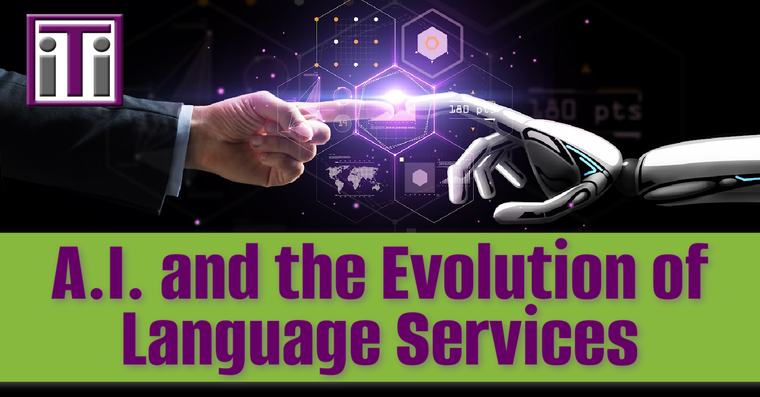
Artificial Intelligence: The words send a ripple of excitement through industries around the world, and for those in language services, it signifies both challenges and opportunities. In an era dominated by rapid technological advancement, the language service industry is not exempt from transformation. The rising prominence of Artificial Intelligence (AI), particularly Generative Artificial Intelligence (GenAI), has sparked a fascinating evolution in the domains of translation and localization.
Interpreters and Translators, Inc. (iTi) has long been a strong proponent of human translation, but as the technology advances, it’s impossible to ignore the fact that GenAI will play an increasing role in the future of language services.
So, how will Language Service Providers (LSPs) like iTi adapt and evolve?

CSA Research recently published an intriguing article that had industry CEOs reflecting on GenAI’s potential in the language service domain. It revealed insights that every LSP should be considering. The piece titled, “CEOs Reflect on GenAI – July 2023”, is packed with illuminating perspectives.
One striking quote from the article, by Konstantin Loseliani of Janus Worldwide, states, “Time-tested business strategies may no longer be effective. It is crucial to be flexible, respond to change, and develop the ability to anticipate trends. One must not be afraid of change and should be able to identify new opportunities in any transformation.”
Post-Editing Machine Translation (PEMT) has become an integral component in the translation process. With AI at the helm, machine-generated translations have become more accurate and nuanced. Lionbridge, a Massachusetts-based language service company and an early adopter of PEMT, states that this service helps them deliver translations with faster turnaround times and lower costs by combining machine translation and human expertise.
Localization isn’t just about translating words; it’s about ensuring that content resonates with the target audience culturally and contextually. At iTi, we maintain that human translators who are native speakers of a language, and who have lived an been educated in the region where the language or dialect is spoken, will always have more cultural fluency than an AI tool.
However, Artificial Intelligence can assist translators by analyzing changes in local trends, preferences, and cultural nuances.
To cite the article again, CEO Paul Carr was quoted as saying, “The localization landscape is about to change dramatically. Localization leaders need to be out in front to ensure they are well-positioned to help their corporations take advantage of the opportunities that generative AI presents.”

With all the advancements and benefits brought about by AI in translation and localization, there remains an irreplaceable element: the human touch. AI might generate content, but the essence, the nuance, and the emotion are best captured and refined by humans.
As Scott Klein, the CEO of LanguageLine Solutions states in the CSA Research article, “Human oversight and quality assurance processes should play a crucial role in ensuring that translations are accurate, culturally appropriate, and contextually relevant.”
The integration of Artificial Intelligence into the language service industry is not a mere trend; it’s a transformational shift. While AI, especially GenAI, offers powerful tools, it’s the collaboration between humans and machines that will define the future of translation and localization.
As Dominic Laporte, CEO of Translation Bureau of Canada, states: “Linguistic services providers need to fight the popular belief that artificial intelligence has triggered a downward spiral for language professions. Now more than ever, we must focus on marketing and education with not only our clients, but also the future generations of language professionals we desperately need.”
iTi is excited to consider how we will grow as part of this evolution, harnessing the power of AI while preserving the invaluable human touch that makes language services truly resonate. To learn more about translation, localization or any of our language solutions, click the link below or call us directly at 860.968.6777.
| Talk to an Expert |
The original version of this page was published at: https://blog.ititranslates.com/2023/08/08/a-i-and-the-evolution-of-language-services/
Our healthcare language services ensure compliance by the Joint Commission and improved patient satisfaction. iTi's suite of health language services enables seamless contact between patients and m... Read more
Life expectancy in the U.S. fell by 1.5 years in 2020, the biggest decline since World War II, according to new data from the Centers for Disease Control and Prevention (CDC).What ...read more
If you’re looking for healthcare interpreting or translation services, you likely have some questions. Fortunately, as a healthcare interpreting company serving hospitals and ...read more
Google recently announced an update to its search algorithm that will enable it to process and correlate data across different languages, industries, and subjects like never before. ...read more
Top Takeaways:Study your web metricsLocalize your top pagesAnalyze the competitionBe flexible with branding You have come to the realization that localization is important ...read more